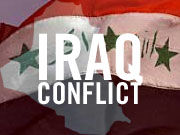Audio
Photos
Resources
Your Voice
| ||||||||||||||||||||||||||
State takes anti-terror precautions
March 18, 2003
 |
| Public Safety Commissioner Rich Stanek says there are no known threats to Minnesota. (MPR Photo/Laura McCallum) |
St. Paul, Minn. — Gov. Pawlenty says Homeland Security Director Tom Ridge told state officials after the president's speech that there's reason to believe terrorist cells will be active once war begins. Ridge's department has raised the nation's terror alert level to orange, or high. It has also put in place "Operation Liberty Shield." Pawlenty says that plan calls for greater security at airports, nuclear power plants and other public places.
"I directed the State Patrol and their rapid response teams to take up a position on four key utility facilities in the state of Minnesota. That is in response to generic concerns. There's no specific -- again -- identifiable or known threats," Pawlenty says.
The four facilities are Minnesota's two nuclear plants in Red Wing and Monticello, the Flint Hills refinery in Rosemount and the Ashland refinery in St. Paul Park. Pawlenty says Minnesotans will also notice National Guard members deployed around Minnesota as a precautionary measure, although he wouldn't say where.
Security has also been beefed up at the Minneapolis-St. Paul International Airport. Spokesman Pat Hogan says travelers will see more police at the airport, and vehicles may be stopped for random inspections. But Hogan says the random searches shouldn't pose a major inconvenience.
"They're looking for big explosive items. They're not, you know, going through people's glove boxes or looking at personal items. So it doesn't take long, it's not too much of a hassle and it does increase security at the airport," says Hogan.
The Transportation Security Administration directed the airport to begin the searches. Similar inspections were done briefly last month when the nation was also under an orange terror alert. Minnesota's Homeland Security director, Public Safety Commissioner Rich Stanek, says the state is prepared for whatever a war with Iraq might bring.
"The local police and sheriffs, and first responders statewide are ready to respond to any unlikely event," Stanek says. "And the FBI and the state Office of Homeland Security are working together to disrupt any plans for an attack."
Both Stanek and Pawlenty stressed that citizens have a role to play in terrorism preparedness. They called on Minnesotans to be aware of any suspicious activity and report it to law enforcement. At the same time, the governor urged Minnesotans to continue their daily routines.
"Mall of America, travel on roads and bridges, travel by air, going to work every day and all the normal activities should continue," Pawlenty says. "We strongly encourage Minnesotans to not alter their plans or activities, just simply be more alert and aware."
State officials plan to open the Emergency Operations Center in St. Paul once a war begins.
"We've operated under the assumption that this (war) would occur at some point, so we're being proactive to whatever the situation entails," said Kevin Smith, spokesman for the Department of Public Safety.
Once the EOC is activated, Minnesotans can call a 24-hour hotline with their concerns: (800) 657-3504 in outstate Minnesota. A similar line averaged between 300 to 500 calls in the first few hours after the Sept. 11 attacks, Smith said.
"This helps take the burden off 911 operators in case people have questions about preparedness," said Smith, recalling the frenzy and furor on Sept. 11. "Our strategy is to stay ahead."
|
News Headlines
|
Related Subjects
|

